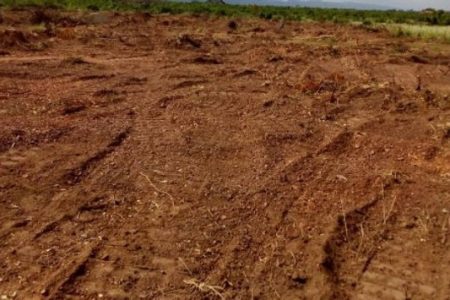It has emerged that foreigners grabbing lands in Ghana for shockingly low amounts of money is fast rising.
Sharing the ordeal of farmers and other landowners from Breweniase, Nkwanta South Constituency in the Volta Region Mr Johannes Kofibi, a community member, said: “We’ve dug our own graves and signed our death warrants.”
He said in 2008, they leased about 3,715 acres of land to a multinational company for 50 years, which offered the landowners $5 per year.
Mr Kofibi said the situation (losing lands to multinationals) sometimes pushed some young ladies to migrate to city centres, including Accra, where they allegedly engaged in prostitution, while the young men resort to menial jobs and at times, social vices for survival.
A landowner from Babator also told the GNA that they started experiencing disputes in 2014 after leasing 5,000 acres of land for 50 years to a company, led by chiefs in the community, without understanding the contract.
Foreigners grabbing lands
The lack of knowledge on land acquisition process and legal framework in Ghana is causing some communities to lose their lands, income and source of livelihoods to multinationals and property developers.
This is contained in the findings of a study launched in Accra by Caritas Ghana in conjunction with the Alliance for Food Sovereignty in Africa (AFSA) on four rural communities, where lands were allocated mainly on family basis.
The study found that it was only the Subinso community in the Eastern region where 67% members had knowledge about statutory agencies, existing legal frameworks and processes for the acquisition of land in Ghana.
In Tanchara in the Upper East Region, 73% had no knowledge about the statutory agencies, existing legal frameworks and processes governing the acquisition of land.
Also, 65% community members of Babator (Savannah region), and 67% community members of Breweniase (Oti region) said that they had no knowledge about the transfers of the lands, which they often leased for decades.
Mr Kofibi said the situation of losing lands to multinationals a clear case of foreigners grabbing lands sometimes pushed some young ladies to migrate to city centres, including Accra, where they allegedly engaged in prostitution, while the young men resort to menial jobs and at times, social vices for survival.
Dr Patrick Tandoh-Offin, a Rural Development expert and Lead for the study, reiterated the issues of land grabbing and forceful acquisition of large parcels of land by some transnational corporations, individuals, and the State.
The situation, he said, made it difficult particularly for the youth and women in Subinso, Tanchara, Babator and Breweniase to have access to lands needed for farming and other economic activities.
He said coupled with that was the expensive nature of land documentation, which was discouraging poor landowners from registering their lands.
In all the communities, landowners often relied on chiefs and community level intermediaries to have access to land and landed properties.
That resulted in disputes among landowners and local stakeholders or traditional authorities, with issues of double sale of lands and ownership.
Tandoh-Offin recommended that the National Commission for Civic Education (NCCE), Lands Commission, the media and other stakeholders intensified education and sensitisation efforts on the protocols and legal procedures for land acquisition.
He also called for a unified computerised system for land management with a verifiable data repository for land purchase fed into an information system that would be verified and certified by a third party.
Mr Hope Boye Agbah, a Land Adminstration Officer at the Ministry of Lands and Natural Resources, said in collaboration with the Lands Commission, his outfit had come up with guidelines on large scale acquisition of lands.
He explained that because people had little or no knowledge about the acquisition of such lands, it displaced community members and robbed them of their livelihoods prior.
“We’re in the process of disseminating information about the passage of the new Land Act 2020 (Act 1036), which would help resolve such land acquisition issues,” he said.
In her remarks, Regina Ignatia Aflah, Chairperson of Caritas Ghana, said the report demonstrated the collective power of faith and non-faith actors in working together to address the issues of land rights, acquisition and food sovereignty.
“We believe this report is a valuable addition to existing body of knowledge, and will help strengthen CSOs dialogue and actions to strive for equitable land access and food sovereignty,” she said.
GNA
- Prof Opoku-Agyemang seeks medical treatment abroad - 30 March 2025
- 3 missing in suspected pirate attack on fishing vessel - 29 March 2025
- MPs to blow GH₵41.2m monitoring GH₵55m projects - 29 March 2025

